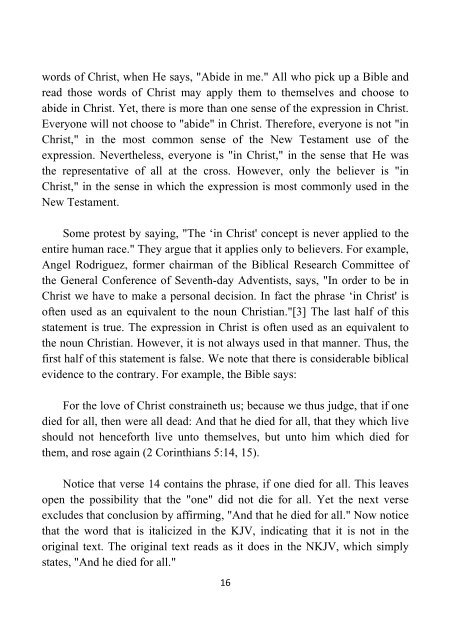Message of the Latter Rain - Kelvin M. Duncan
You also want an ePaper? Increase the reach of your titles
YUMPU automatically turns print PDFs into web optimized ePapers that Google loves.
words <strong>of</strong> Christ, when He says, "Abide in me." All who pick up a Bible and<br />
read those words <strong>of</strong> Christ may apply <strong>the</strong>m to <strong>the</strong>mselves and choose to<br />
abide in Christ. Yet, <strong>the</strong>re is more than one sense <strong>of</strong> <strong>the</strong> expression in Christ.<br />
Everyone will not choose to "abide" in Christ. Therefore, everyone is not "in<br />
Christ," in <strong>the</strong> most common sense <strong>of</strong> <strong>the</strong> New Testament use <strong>of</strong> <strong>the</strong><br />
expression. Never<strong>the</strong>less, everyone is "in Christ," in <strong>the</strong> sense that He was<br />
<strong>the</strong> representative <strong>of</strong> all at <strong>the</strong> cross. However, only <strong>the</strong> believer is "in<br />
Christ," in <strong>the</strong> sense in which <strong>the</strong> expression is most commonly used in <strong>the</strong><br />
New Testament.<br />
Some protest by saying, "The ‘in Christ' concept is never applied to <strong>the</strong><br />
entire human race." They argue that it applies only to believers. For example,<br />
Angel Rodriguez, former chairman <strong>of</strong> <strong>the</strong> Biblical Research Committee <strong>of</strong><br />
<strong>the</strong> General Conference <strong>of</strong> Seventh-day Adventists, says, "In order to be in<br />
Christ we have to make a personal decision. In fact <strong>the</strong> phrase ‘in Christ' is<br />
<strong>of</strong>ten used as an equivalent to <strong>the</strong> noun Christian."[3] The last half <strong>of</strong> this<br />
statement is true. The expression in Christ is <strong>of</strong>ten used as an equivalent to<br />
<strong>the</strong> noun Christian. However, it is not always used in that manner. Thus, <strong>the</strong><br />
first half <strong>of</strong> this statement is false. We note that <strong>the</strong>re is considerable biblical<br />
evidence to <strong>the</strong> contrary. For example, <strong>the</strong> Bible says:<br />
For <strong>the</strong> love <strong>of</strong> Christ constraineth us; because we thus judge, that if one<br />
died for all, <strong>the</strong>n were all dead: And that he died for all, that <strong>the</strong>y which live<br />
should not henceforth live unto <strong>the</strong>mselves, but unto him which died for<br />
<strong>the</strong>m, and rose again (2 Corinthians 5:14, 15).<br />
Notice that verse 14 contains <strong>the</strong> phrase, if one died for all. This leaves<br />
open <strong>the</strong> possibility that <strong>the</strong> "one" did not die for all. Yet <strong>the</strong> next verse<br />
excludes that conclusion by affirming, "And that he died for all." Now notice<br />
that <strong>the</strong> word that is italicized in <strong>the</strong> KJV, indicating that it is not in <strong>the</strong><br />
original text. The original text reads as it does in <strong>the</strong> NKJV, which simply<br />
states, "And he died for all."<br />
16

















